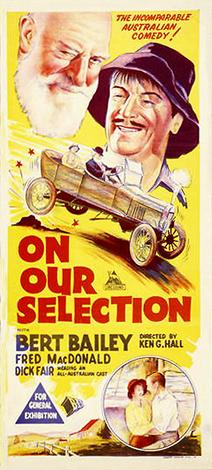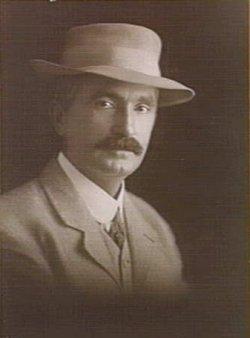
Steele Rudd was the pen name of Arthur Hoey Davis an Australian author, best known for his short story collection On Our Selection.

Kenneth George Hall was an Australian film producer and director, considered one of the most important figures in the history of the Australian film industry. He was the first Australian to win an Academy Award.

Cinesound Productions Pty Ltd was an Australian feature film production company. Established in June 1931, Cinesound developed out of a group of companies centred on Greater Union Theatres that covered all facets of the film process, from production to distribution and exhibition. Cinesound Productions established a film studio as a subsidiary of Greater Union Theatres Pty Ltd based on the Hollywood model. The first production was On Our Selection (1932), which was an enormous financial success.

Dad and Dave Come to Town is a 1938 Australian comedy film directed by Ken G. Hall, the third in the 'Dad and Dave' comedy series starring Bert Bailey. It was the feature film debut of Peter Finch and is one of the best known Australian films of the 1930s.
Dad and Dave: On Our Selection is an Australian comedy film, based on the characters and writings of author Steele Rudd. It is set in late nineteenth century colonial Queensland, but largely filmed in Braidwood, New South Wales. The stories of the Rudds have been previously adapted for radio, television, and film. Geoffrey Atherden contributed to the screenplay with George Whaley, the latter of whom directed. This film featured numerous well-known Australian actors, such as Noah Taylor, Ray Barrett, Essie Davis, Murray Bartlett, Celia Ireland, Barry Otto, Nicholas Eadie, and future Oscar-winner Geoffrey Rush as the titular endearingly blundering son, Dave.
The Squatter's Daughter is a 1933 Australian melodrama directed by Ken G. Hall and starring Jocelyn Howarth. One of the most popular Australian films of the 1930s, it is based on a 1907 play by Bert Bailey and Edmund Duggan which had been previously adapted to the screen in 1910.
The Silence of Dean Maitland is a 1934 Australian film directed by Ken G. Hall, and based on Maxwell Gray's 1886 novel of the same name. It was one of the most popular Australian films of the 1930s.

Strike Me Lucky is a 1934 Australian comedy musical film starring popular stage comic vaudevillian Roy Rene in his first and only film. It was the fourth feature film from Cinesound Productions but proved a box office disappointment. Director Ken G. Hall claimed it was the only one of his features not to go into profit within a few years of release, although the film eventually covered costs.

Grandad Rudd is a 1935 comedy featuring the Dad and Dave characters created by Steele Rudd and based on a play by Rudd. It was a sequel to On Our Selection, and was later followed by Dad and Dave Come to Town and Dad Rudd, MP.
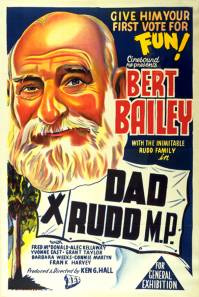
Dad Rudd, M.P. is a 1940 comedy that was the last of four films made by Ken G. Hall starring Bert Bailey as Dad Rudd. It was the last feature film directed by Hall prior to the war and the last made by Cinesound Productions, Bert Bailey and Frank Harvey.
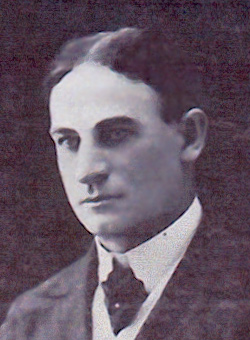
Albert Edward Bailey, better known as Bert Bailey, was a New Zealand-born Australian playwright, theatrical manager and stage and screen actor best known for playing Dad Rudd, in both mediums, the character from the books penned by Steele Rudd.

The Hayseeds Come to Sydney is a 1917 Australian rural comedy from director Beaumont Smith.
On Our Selection is a 1912 Australian play by Bert Bailey and Edmund Duggan based on the stories with the same name by Steele Rudd. Bailey played Dad Rudd in the original production.
On Our Selection is a 1920 Australian silent film directed by Raymond Longford based on the Dad and Dave stories by Steele Rudd.
Alec Kellaway was a South African–born actor best known for his work in Australian theatre and film, notably playing a number of character roles for director Ken G. Hall. He was the brother of Cecil Kellaway. He also worked as a producer in vaudeville and helped run the Talent School at Cinesound Productions.
Fred MacDonald (1895–1968), was an Australian actor best known for playing Dave Rudd opposite Bert Bailey on stage and screen, starting with the original 1912 production of On Our Selection. He also played a similar role, Jim Hayseed, several times on screen for director Beaumont Smith.
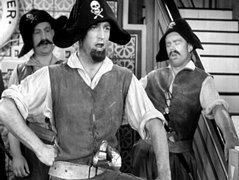
Cinesound Varieties is a 1934 Australian variety short film from director Ken G. Hall made to go out on a double-bill with the full-length feature, The Silence of Dean Maitland (1934). Only 18 minutes of the film survive today.
William Freshman was an Australian-born actor, scriptwriter and director. He moved to England as a child and worked in the British film industry, writing over 20 screenplays and working as an associate producer at British International Pictures. He also wrote the play The Last of the Ladies.
George Heath was an Australian cinematographer best known for his collaboration with Ken G. Hall for whom he shot several features. According to one observer, he fitted into the Cinesound world far more than his predecessor, Frank Harley - "Heath adapted much more easily to studio work and soon developed into a technician of world class. His work on the features was always attuned to the demands of the film and its future audience: his images show few of the pretensions to grandeur which are to be found in the work of Hurley, and instead his photography is clear, expressive and undemanding."
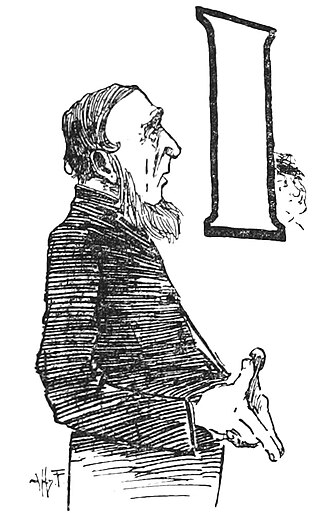
On Our Selection (1899) is a series of stories written by Australian author Steele Rudd, the pen name of Arthur Hoey Davis, in the late 1890s, featuring the characters Dad and Dave Rudd.
